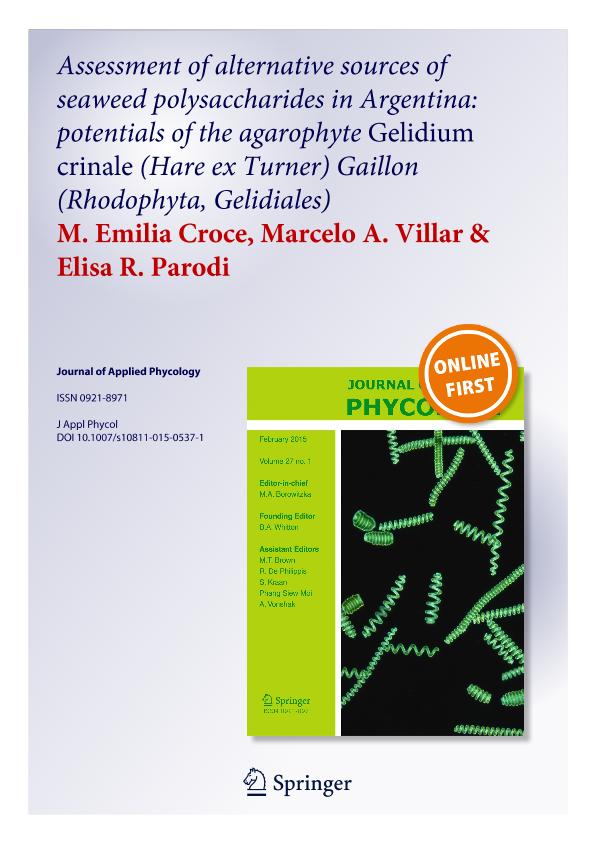Mostrar el registro sencillo del ítem
dc.contributor.author
Croce, Maria Emilia

dc.contributor.author
Villar, Marcelo Armando

dc.contributor.author
Parodi, Elisa Rosalia

dc.date.available
2017-02-03T21:44:54Z
dc.date.issued
2015-10
dc.identifier.citation
Croce, Maria Emilia; Villar, Marcelo Armando; Parodi, Elisa Rosalia; Assessment of alternative sources of seaweed polysaccharides in Argentina: potentials of the agarophyte Gelidium crinale (Hare ex Turner) Gaillon (Rhodophyta, Gelidiales); Springer; Journal Of Applied Phycology; 27; 5; 10-2015; 2099-2110
dc.identifier.issn
0921-8971
dc.identifier.uri
http://hdl.handle.net/11336/12522
dc.description.abstract
The phycocolloids industry in Argentina has been based on the importation of non-native species and the exploitation of natural populations of Gracilaria, which are currently declining. This study was carried out to evaluate the potential of Gelidium crinale as an unexploited source of agar in this country. The yield and composition of polysaccharides extracted from G. crinale, as well as the growth potential of this species were studied. In vitro cultures of apical sections were carried out; relative growth rates (RGR) and data were analyzed through repeated measurements. Explants rapidly duplicated their initial size, producing numerous proliferations and achieving structural complexity. RGR of explants, primary proliferations, and secondary proliferations were high and similar. Polysaccharide extraction was done under three conditions: acid pre-extraction treatment + pressure boiled (AP), water pre-extraction treatment + pressure boiled (WP), and water pre-extraction treatment + boiled (WB). Polysaccharides were characterized through infrared spectroscopy, X-ray fluorescence, thermogravimetric, and elemental analysis. Polysaccharides obtained corresponded to the agar-type, and showed high similarity to commercial agar samples, with low sulfate and methyl contents. Higher yields were obtained with pressure extractions; however, acid treatment did not increase the amount of extracted biopolymers. Their degradation occurred in the range 250–400 °C. Polysaccharides obtained under AP conditions had a degradation curve similar to food-grade agar-agar, whereas degradation curves of polysaccharides obtained without acid treatment were similar to biotechnology-grade agar-agar. According to the results, G. crinale from Anegada Bay produces a high-quality agar to be considered for the Argentinean agar industry; however, micropropagation techniques would be indispensable to increase its bioavailability.
dc.format
application/pdf
dc.language.iso
eng
dc.publisher
Springer

dc.rights
info:eu-repo/semantics/openAccess
dc.rights.uri
https://creativecommons.org/licenses/by-nc-sa/2.5/ar/
dc.subject
Agar
dc.subject
Apices
dc.subject
Ft-Ir
dc.subject
In Vitro Culture
dc.subject
Relative Growth Rate
dc.subject
Thermogravimetry
dc.subject.classification
Bioproductos, Biomateriales, Bioplásticos, Biocombustibles, Bioderivados, etc.

dc.subject.classification
Biotecnología Industrial

dc.subject.classification
INGENIERÍAS Y TECNOLOGÍAS

dc.title
Assessment of alternative sources of seaweed polysaccharides in Argentina: potentials of the agarophyte Gelidium crinale (Hare ex Turner) Gaillon (Rhodophyta, Gelidiales)
dc.type
info:eu-repo/semantics/article
dc.type
info:ar-repo/semantics/artículo
dc.type
info:eu-repo/semantics/publishedVersion
dc.date.updated
2017-02-03T17:51:55Z
dc.identifier.eissn
1573-5176
dc.journal.volume
27
dc.journal.number
5
dc.journal.pagination
2099-2110
dc.journal.pais
Alemania

dc.journal.ciudad
Berlín
dc.description.fil
Fil: Croce, Maria Emilia. Consejo Nacional de Investigaciones Científicas y Técnicas. Centro Científico Tecnológico Bahía Blanca. Planta Piloto de Ingeniería Química (i); Argentina. Consejo Nacional de Investigaciones Científicas y Técnicas. Centro Científico Tecnológico Bahía Blanca. Instituto Argentino de Oceanografía (i); Argentina
dc.description.fil
Fil: Villar, Marcelo Armando. Consejo Nacional de Investigaciones Científicas y Técnicas. Centro Científico Tecnológico Bahía Blanca. Planta Piloto de Ingeniería Química (i); Argentina
dc.description.fil
Fil: Parodi, Elisa Rosalia. Consejo Nacional de Investigaciones Científicas y Técnicas. Centro Científico Tecnológico Bahía Blanca. Instituto Argentino de Oceanografía (i); Argentina. Universidad Nacional del Sur. Departamento de Biología, Bioquímica y Farmacia. Laboratorio de Ecología Acuática; Argentina
dc.journal.title
Journal Of Applied Phycology

dc.relation.alternativeid
info:eu-repo/semantics/altIdentifier/url/http://link.springer.com/article/10.1007%2Fs10811-015-0537-1
dc.relation.alternativeid
info:eu-repo/semantics/altIdentifier/doi/http://dx.doi.org/10.1007/s10811-015-0537-1
Archivos asociados
